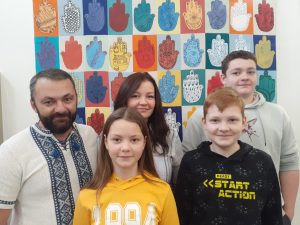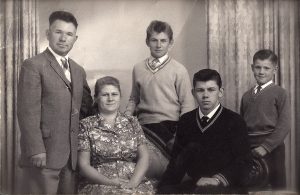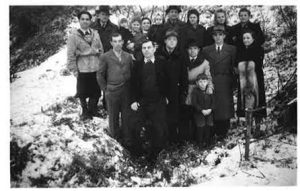From war to Wodonga – a refugee family’s journey
A Ukrainian family who fled the war in their homeland have found sanctuary and the chance of a new life in Wodonga thanks to the generosity of a local businessman.
Denys Fuhol and wife and three kids have taken up the offer of a job as a welder and a free house in the town after local engineering contractor John Butko, whose parents fled famine in Ukraine in 1949, heard of their plight.
Mr Butko put out the offer of a welding job with his firm though the Ukrainian Honorary Consul in Sydney and through a circuitous route, it was offered to Denys.
He and his family visited Wodonga, he met Mr Butko and accepted the job. They are now starting a new life on the Murray River.
Denys and his family were forced to flee their home in the Donetsk region, in Eastern Ukraine, in 2013 as a result of the first Russian invasion of Ukraine.

The Fuhol Family
As the conflict continued with Russian forces backing ethnic Russian separatists more parts of the Donbas region came under effective Russian occupation; and Denys’ family was forced to move five more times over the next nine years.
“When the war broke out on February 24, Ukraine stopped. I was working as a manager in a large bakery supply good across Europe but when the war came, I had no job,’ Denys said.
“I had to decide what was best for my family and I looked at what the options were – and Australia seemed to be the best option,” he said.
The family’s final home in Ukraine was in the town of Ivano Frankivisk, in the country’s west, which has been the target of a major Russian attacks since March.
“It was the last straw for us. There were rocket attacks and we were bombed three times. The kids were running into bunkers to avoid the attacks,” Denys said.
“I had had enough and I wanted to take my family somewhere safe,” he said.
The Fuhol family made their way through southern Ukraine into Hungary and reached Budapest from which they flew, via Frankfurt and Bangkok, to Melbourne, arriving on June 8.
Denys’ wife Mariia has a sister who has lived in Melbourne for several years and she organised visas and helped with travel arrangements.
Denys said he sold everything he could to help fund his family’s flight from danger.
“I had to sell everything I could – mostly for a fraction of what it was worth – to get money to be able to bring my family to safety,” he said.
The Fuhols were surprised at the support they received on arrival in Australia.
“We were met at the airport by someone who could speak Ukrainian. All our basic needs have been taken care of. We have been given donated clothing because we arrived with very little,” Denys said.
“We had access to interpreters, we were given somewhere to live and our kids were introduced to school. We didn’t expect this and we are very grateful but I wanted to work to support my family,” he said.
The family has been supported since their arrival by migrant and refugee settlement agency AMES Australia and particularly by their Case Manager Stella Liptak and Community Support Worker Nick Soloczynskyj. And it was Nick who connected Denys with the opportunity in Wodonga.
“I heard about the job through Ukrainian community connections and when I was translating an AMES housing information session, I remembered Denys said he had worked as a welder,” Nick said.
Denys was quick to grasp the opportunity of a job which comes with a free house for six months.
“Although I worked as a bakery manager, twenty years ago I was a welder and I thought it would be easier to get a job in Australia as a welder,” he said.
“We went to Wodonga and I met John. I did a welding trial as I haven’t actually worked as a welder for twenty years – but it went well and I was offered the job.
“We looked around the town and we liked what we saw. It reminded me of home.”
Denys said his family are “ecstatic” about the opportunity they have.
“When we first arrived we were in a bit of shock and jet-lagged for about a week. But we have become accustomed to being here very quickly; and we are looking forward to the future. We want this to be our sixth and final home,” he said.
“We have had to move so many times, we want to stay put here in Australia now.
“I have a job, we have a house and the kids will go to school and make friends that they won’t have to leave behind.
“It had always been a dream of mine to come to Australia and that it has come to fruition so quickly is absolutely super,” he said.
Denys says he wants to become an Australian citizen and he wants his three children Nykita, 16, Mykhailo, 12 and Anastasiia, 10, all of the opportunities Australia offers.
“We have enough of moving. Our kids now have a safe place to grow up. They will be able to form long-term friendships and focus on their studies,” he said.
“Everything has fallen in to place for us. We are very lucky,” Denys said.

The Butko Family
John Butko, who runs Butko Engineering in Wodonga said he felt compelled to do something after seeing the destruction inflicted on his parents’ homeland.
“My parents came from Ukraine in 1949 and they would have witnessed the same sort of thing the people coming to Australia now,” Mr Butko said.
“I was born here but my brothers were born in Austria and Germany as refugees. I started my engineering business as a one man band but we have done well and built it up over the years.
“That wouldn’t have happened if Australia had not helped my parents. I spoke to my wife and I said ‘we are in position to help, so we should’,” Mr Butko said.
Accommodation is difficult to find in Albury Wodonga so the Butkos bought an old house and refurbished to be able to offer a refugee family a home as well as a job.
“We furnished the house and filled the fridge and we’re happy to be

The Butko Family
able to give Denys the same opportunity my parents got when they came to Australia,” Mr Butko said.
“They were also the victims of Russian aggression in the form of a famine crated by Stalin’s policies. It seems like nothing has changed,” he said.












